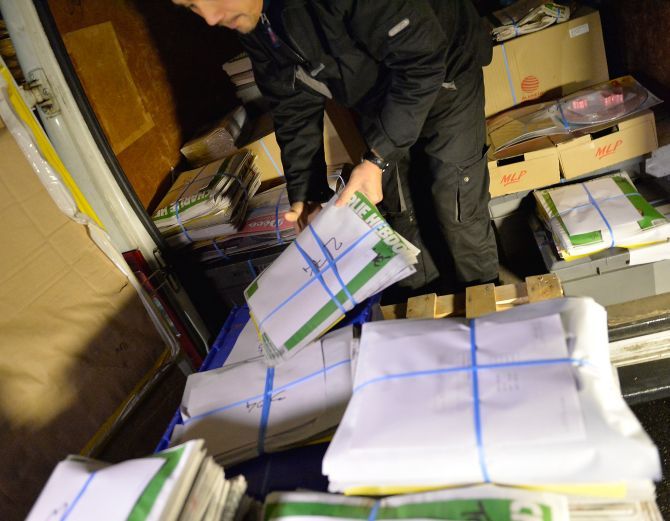 The Bombay high court on Monday restrained the Maharashtra government and the police from taking any coercive steps, including arrest, against the editor of an Urdu daily at the centre of a row over publishing the cover of French magazine Charlie Hebdo that featured a cartoon of the Prophet Mohammed.
The Bombay high court on Monday restrained the Maharashtra government and the police from taking any coercive steps, including arrest, against the editor of an Urdu daily at the centre of a row over publishing the cover of French magazine Charlie Hebdo that featured a cartoon of the Prophet Mohammed.
The interim order was passed by a division bench of Justices Ranjit More and Anuja Prabhudesai on a petition filed by Shirin Dalvi, editor of Urdu newspaper Awadhnama, whose Mumbai edition has been shut down following the publication of the cartoon last month.
Forty-six-year-old Dalvi, a resident of Mumbra in nearby Thane district, has sought quashing of the cases against her and clubbing together all cases filed against her following the publication of the cartoon while she prayed for a direction to prevent the government and police from taking coercive action against her, including arrest. The matter was adjourned till February 11 after Public Prosecutor S S Shinde sought time to seek instructions from the government on the relief sought by Dalvi.
The newspaper had reproduced the cartoon published in French satirical magazine Charlie Hebdo, the target of an attack by Islamist militants last month.
Altogether, five cases have been filed against Dalvi under section 295 A of the Indian Penal Code which deals with outraging religious feelings of people with deliberate and malicious intent. The cases include two in Mumbai, two in Thane and one in Malegaon, prosecutor Shinde informed the court.
Dalvi had secured a regular bail after her arrest in the first case filed in Mumbra town, while she had got anticipatory bail in the one filed at N M Joshi Marg police station in Mumbai, her lawyers Mihir Desai and Chetan Mali told the court.
While seeking interim relief, advocate Desai said the petitioner was not going home as she feared for her life. The editor pleaded that she was the only woman editor of an Urdu daily newspaper in India and that due to the events following the publication of the Prophet's cartoon she is facing threats of physical attacks. Several FIRs have been filed against her and she also had to abandon her home.
Dalvi further said that her children had to discontinue their education and were compelled to go incognito along with their mother out of fear of physical harm.
The newspaper had published the cartoon on January 17 and the very next day it had apologised for carrying it. On January 19, the newspaper had closed down as it apprehended violence.
Dalvi said in her petition that the January 17 article was published on the front page of her newspaper reporting the statements of the Pope on how those who disgrace a religion must be prepared to face dire consequences. The petition said the article had also reported how the Pope advised cartoonists of Charlie Hebdo to protect themselves after the attacks and mentioned the increased readership of the French magazine after the attack on its office in Paris.
The petition said the French magazine had carried many cartoons on religion on its cover pages which it published on a weekly basis much before the attack and warning by the Pope. One of these cover pages was used alongside the article. However, on seeing the image, several readers felt offended. "In fact, the cover page was used by newspaper to make the readers aware of what the Pope was talking about and it was only in that context that the cover page published by Charlie Hebdo was used," Dalvi's petition contended.
The petitioner said she had tendered an apology for publishing the cartoon after receiving telephone calls from readers that it could hurt religious feelings. Since this was not her intention at all, she decided to tender an apology, the petition said.
Dalvi further said that FIRs were filed across the state against her, several of which she is not aware of. She said she is also afraid that some complaints may have been filed against her outside the state.
Dalvi pleaded that her acts do not constitute any offence and that none of the ingredients of Section 295 A IPC is made out in the acts alleged against her in the cases. She contended that the cartoon had only been reproduced alongside her article and she had no deliberate intention to hurt religious feelings of any class of people.
The petitioner said she was within her right to publish an article with the cover page of the Charlie Hebdo to inform her readers of what the Pope had said.
Image: The edition of Charlie Hebdo which was published after the attack on its Paris office










